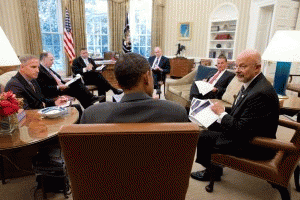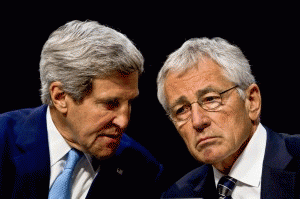Reprinted from Consortium News

Director of National Intelligence James Clapper (right) talks with President Barack Obama in the Oval Office, with John Brennan and other national security aides present.
(Image by (Photo credit: Office of Director of National Intelligence)) Details DMCA
The biggest story in Jeffrey Goldberg's 20,000-word report on "The Obama Doctrine" is President Barack Obama's open break with the foreign policy establishment.
The critique of orthodox national security policy thinking that Obama outlined in interviews with Goldberg goes farther than anything delivered on the record by a sitting president. It showed that Obama's view on how to define and advance U.S. "national security" diverges sharply from those of the orthodox views of national security bureaucracy and Washington foreign policy think tanks on U.S. "credibility," the real interests the United States in the Middle East and how the United States should respond to terrorism.
It was the controversy surrounding his decision in the 2013 Syrian crisis not to authorize airstrikes against government forces that provoked Obama to go public with his position in that broader struggle. The foreign policy elite in Washington has issued a steady drumbeat of opinion pieces portraying Obama's failure to launch a cruise missile attack against the Syrian air force and its air defense system in 2013 as a major blow to the U.S. role in the world because it forfeited U.S. "credibility."
Richard Haass, who is president of the Council on Foreign Relations and the closest thing to a spokesman for the foreign policy establishment, summed up the elite's attitude toward Obama's decision in Syria in a Feb. 23 tweet. Haass suggested that Obama's decision not to bomb Assad regime targets was on par with the Bush administration's U.S. invasion of Iraq. In his tweet, Haass linked to another attack on Obama's decision by Laurent Fabius, the recently retired former French Foreign Minister. On Twitter, Haass wrote: "2003 #Iraq war error of commission; not enforcing #Syria red line error of omission. fair debate which more costly."
But the more important struggle over that decision was played out within the administration between Obama and Secretary of State John Kerry, who led the charge in pressing the President to carry out cruise missile strikes against the Assad regime military targets over its alleged responsibility for the Aug. 21, 2013 Sarin attack.
"There's a playbook that presidents are supposed to follow," Obama told Goldberg. "[T]he playbook prescribes responses to different events and those responses tend to be militarized responses."
Such a "playbook" can be "a trap that can lead to bad decisions," Obama continued. "In the midst of an international challenge like Syria, you can get judged harshly if you don't follow the playbook, even if there are good reasons why if does not apply."
Goldberg writes that Obama "had come to believe that he was walking into a trap -- one laid both by allies and adversaries, and by conventional expectations of what an American president is supposed to do." Obama was implying that he was being pushed into committing U.S. military force to the Syrian conflict less to eliminate the threat of chemical weapons than to tilt the military balance in favor of the opposition and to support "regime change" -- something Obama did not want to do.
John Kerry made no bones about his commitment to striking government military targets. In Senate testimony on Sept. 3, 2013, he referred 28 times to the idea that such strikes would "deter" Assad from further chemical weapon attacks but also "degrade" the government's military capabilities.

Defense Secretary Chuck Hagel, right, and Secretary of State John Kerry confer as they testify on the potential use of military force in Syria before the Senate Foreign Relations Committee in Washington, D.C., Sept. 3, 2013.
(Image by (DOD photo by Erin A. Kirk-Cuomo)) Details DMCA
A big reason Obama had begun to doubt the wisdom of a military response to the Aug. 21 attack, Goldberg reports, was that Director of National Intelligence James Clapper came to see Obama on the morning of Aug. 30 and told him that he could not say that the intelligence on Assad having carried out the attack was a "slam dunk."
Clapper's reference was to the misguided assurance that CIA Director George Tenet reportedly gave President George W. Bush in 2002 that the intelligence community could back up Bush's WMD claims about Iraq and that to do so would be a "slam dunk." Clapper was saying that U.S. intelligence was not at all certain that the Assad regime was at fault for the attack. [For more on that topic, see Consortiumnews.com's "Neocons Red-Faced over 'Red Line.'"]
Over the past week, in the mainstream media's denunciations of Obama's comments in The Atlantic, this passage about Clapper's uncertainty about who had launched the Sarin attack is ignored, although it would seem to be a key point. (See, for instance, Washington Post deputy editorial page editor Jackson Diehl's op-ed on Monday or last Friday's New York Times op-ed by columnist Roger Cohen.)
Furthermore, Obama did have an alternative to going to war in Syria that would eliminate any future threat of chemical weapons attacks by Assad's government. In early September 2013, Obama reached an agreement with Russian President Vladimir Putin that Assad would give up his entire chemical weapons arsenal, while the United States would not go to war against Damascus and while Assad continued to deny a role in the Sarin attack.
Questions about "Credibility"
(Note: You can view every article as one long page if you sign up as an Advocate Member, or higher).





